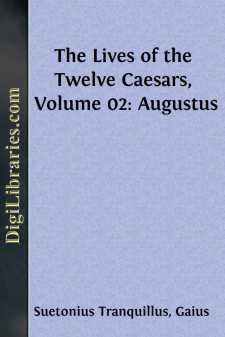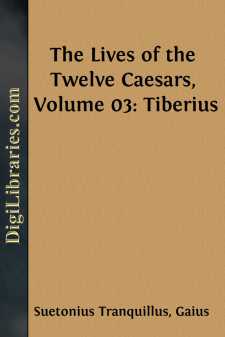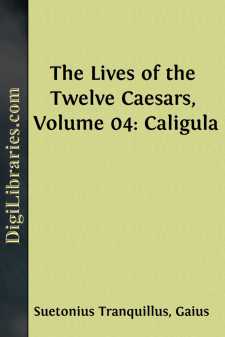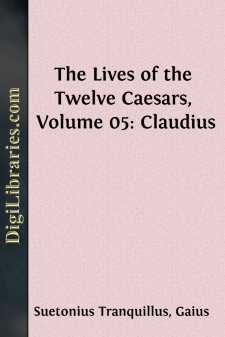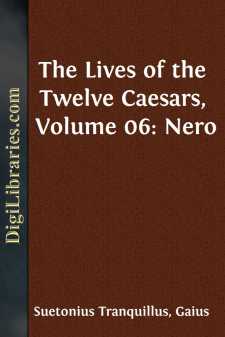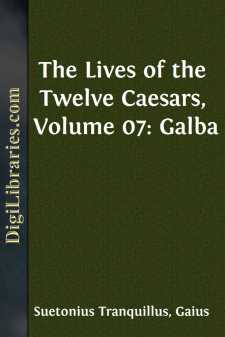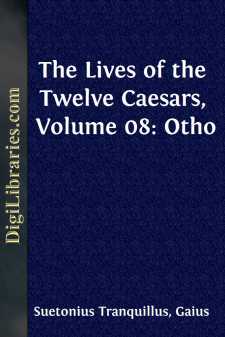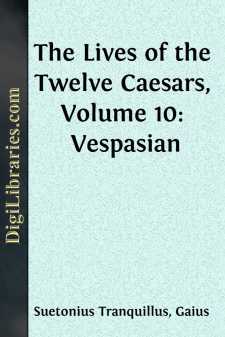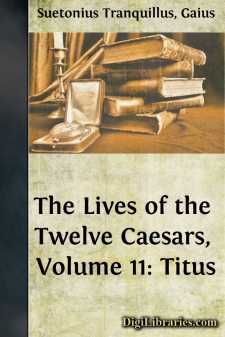Fiction
- Action & Adventure 182
- Biographical 15
- Christian 59
- Classics
- Coming of Age 4
- Contemporary Women 1
- Erotica 9
- Espionage/Intrigue 12
- Fairy Tales, Folklore & Mythology 235
- Family Life 169
- Fantasy 117
- Gay 1
- General 596
- Ghost 32
- Historical 808
- Horror 42
- Humorous 160
- Jewish 25
- Legal 4
- Medical 22
- Mystery & Detective 314
- Political 49
- Psychological 41
- Religious 64
- Romance 158
- Sagas 11
- Science Fiction 730
- Sea Stories 113
- Short Stories (single author) 537
- Sports 10
- Suspense 1
- Technological 8
- Thrillers 2
- Urban Life 29
- Visionary & Metaphysical 1
- War & Military 173
- Westerns 199
Classics Books
Sort by:
I. That the family of the Octavii was of the first distinction in Velitrae [106], is rendered evident by many circumstances. For in the most frequented part of the town, there was, not long since, a street named the Octavian; and an altar was to be seen, consecrated to one Octavius, who being chosen general in a war with some neighbouring people, the enemy making a sudden attack, while he was...
more...
TIBERIUS NERO CAESAR. (192) I. The patrician family of the Claudii (for there was a plebeian family of the same name, no way inferior to the other either in power or dignity) came originally from Regilli, a town of the Sabines. They removed thence to Rome soon after the building of the city, with a great body of their dependants, under Titus Tatius, who reigned jointly with Romulus in the kingdom; or,...
more...
CAIUS CAESAR CALIGULA. (251) I. Germanicus, the father of Caius Caesar, and son of Drusus and the younger Antonia, was, after his adoption by Tiberius, his uncle, preferred to the quaestorship [377] five years before he had attained the legal age, and immediately upon the expiration of that office, to the consulship [378]. Having been sent to the army in Germany, he restored order among the legions,...
more...
I. Livia, having married Augustus when she was pregnant, was within three months afterwards delivered of Drusus, the father of Claudius Caesar, who had at first the praenomen of Decimus, but afterwards that of Nero; and it was suspected that he was begotten in adultery by his father-in-law. The following verse, however, was immediately in every one's mouth: Tois eutychousi kai primaena paidia....
more...
NERO CLAUDIUS CAESAR. (337) I. Two celebrated families, the Calvini and Aenobarbi, sprung from the race of the Domitii. The Aenobarbi derive both their extraction and their cognomen from one Lucius Domitius, of whom we have this tradition: —As he was returning out of the country to Rome, he was met by two young men of a most august appearance, who desired him to announce to the senate and people a...
more...
SERGIUS SULPICIUS GALBA. (400) I. The race of the Caesars became extinct in Nero; an event prognosticated by various signs, two of which were particularly significant. Formerly, when Livia, after her marriage with Augustus, was making a visit to her villa at Veii [639], an eagle flying by, let drop upon her lap a hen, with a sprig of laurel in her mouth, just as she had seized it. Livia gave orders to...
more...
A. SALVIUS OTHO. (416) I. The ancestors of Otho were originally of the town of Ferentum, of an ancient and honourable family, and, indeed, one of the most considerable in Etruria. His grandfather, M. Salvius Otho (whose father was a Roman knight, but his mother of mean extraction, for it is not certain whether she was free-born), by the favour of Livia Augusta, in whose house he had his education, was...
more...
AULUS VITELLIUS. (427) I. Very different accounts are given of the origin of the Vitellian family. Some describe it as ancient and noble, others as recent and obscure, nay, extremely mean. I am inclined to think, that these several representations have been made by the flatterers and detractors of Vitellius, after he became emperor, unless the fortunes of the family varied before. There is extant a...
more...
T. FLAVIUS VESPASIANUS AUGUSTUS. (441) I. The empire, which had been long thrown into a disturbed and unsetted state, by the rebellion and violent death of its three last rulers, was at length restored to peace and security by the Flavian family, whose descent was indeed obscure, and which boasted no ancestral honours; but the public had no cause to regret its elevation; though it is acknowledged that...
more...
TITUS FLAVIUS VESPASIANUS AUGUSTUS. (465) I. Titus, who had the same cognomen with his father, was the darling and delight of mankind; so much did the natural genius, address, or good fortune he possessed tend to conciliate the favour of all. This was, indeed, extremely difficult, after he became emperor, as before that time, and even during the reign of his father, he lay under public odium and...
more...


